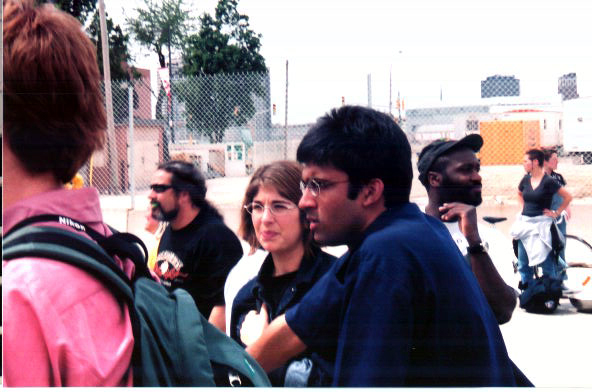|
Look, No Brands In the week leading up to Buy Nothing Day PlaNet backgrounds the book `No Logo' by Naomi Klein. Imagine a world designed by Disney, marketed by Nike, and described by Franz Kafka. When you wake up in this world, you think you are putting your clothes and shoes on, grabbing a coffee, getting in your car and filling it up with petrol; you think you are switching on your computer when you get to work and maybe having a cigarette or a soft drink at about 11. But you are sadly mistaken. What you are actually doing is buying into a lifestyle, having a 'deep emotional connection' with fitness or coffee. Of course, the clothes, the car, etc. really exist, but the plane on which you are experiencing them is a higher one, of ideas and aspirations. And behind the scenes of this enclosed, almost sci-fi universe of concepts and intangibilities is another, horrific one, in which you are exploiting people in sweatshops as you put on your shoes, working them to their deaths, and you are supporting the murder of a Nobel Peace Prizewinner as you fill up your car. We are all already living in this world. And for many the only way out seems to be to listen to Naomi Klein. Klein is the 30 year-old author of No Logo, a book which came out in Britain at the beginning of this year to rapturous reviews, and which has since developed a life of its own. It has been called a manifesto, 'the Das Kapital of the growing anti-corporate movement', and it set out to document the aims and rationale of the group that demonstrated at Seattle and Prague, before those events had even happened. Over the course of this year, No Logo has had a burgeoning, massive success, recommended by word of mouth; all over the world, people are sending loop emails to their friends, telling them how it has changed their life, how something they had felt but not understood has suddenly become clear. Klein now gives talks so often she jokes that she'll 'never write again', though she has a regular column in Canada's national newspaper, The Globe and Mail . This week she is in England, and speaking publicly every night. However, she rejects the idea that No Logo is a manifesto. When she wrote her book `No Logo', she set out to document something, and yet it has been received as a call to arms by those who were ready for one. What exactly is her relationship with her subject, I wonder? 'Well,' she reflects, 'I do think it's strange that sometimes people call it a manifesto, because it's not. But I didn't do it purely as an act of journalism. I did it knowing how I'd become involved in it. I did understand my own relationship to politics, which is that the thing that sways me most is argument. I wanted it to be a journey where at the end you would be onside, and you would think it was inevitable.' The evening after our conversation, Klein gives a talk at a meeting of the World Development Movement, to launch the campaign against Gats (the General Agreement on Trade in Services), an agreement of the World Trade Organisation; 1,000 people are in attendance, and more than a hundred others are turned away. She speaks with great lucidity about how they should not see themselves as anti-trade, only as against the damaging conditions and strings attached to trade. She refers to the movement's roots in colonialism and resistance, and comes back, again and again, to the concept of self-determination. No jargon is resorted to, no issues are fudged. At one point, a Bolivian woman stands up to ask a question. 'Our services have been privatised.' she says. 'Is a riot enough to get our water back?' Klein looks straight at her and leans into the mike. 'No. It's not enough,' she admits, and offers other strategies for getting organised. 'Can we agree on what we're for?' Klein finally asks. 'How can we move from symbolic victories to deeper, more long-lasting change?' Over the course of the evening it becomes clear that Klein can and has made a difference because she is commentator, activist, and guide all at once. 'Our task is not to create a movement from scratch,' she proclaims to a rapt audience. 'Our task is to recognise the movement we already have.' Like the good witch in the Wizard of Oz who tells Dorothy that, in the form of ruby slippers, she has been wearing the means to her end all along, Klein is a prophet who sees the present. She just sees it better than anyone else.
|

